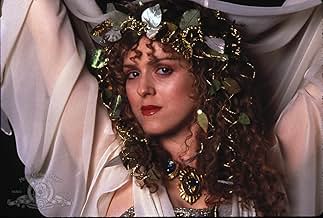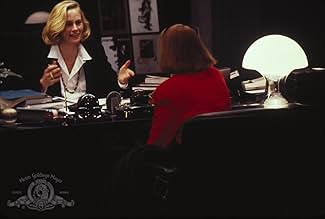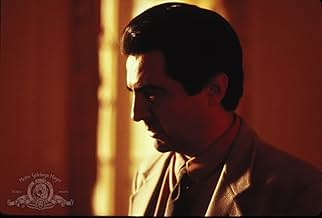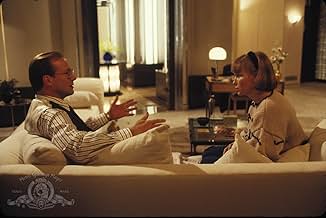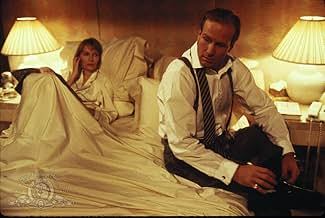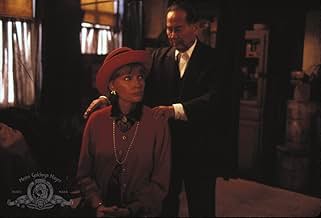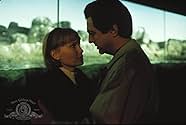AVALIAÇÃO DA IMDb
6,6/10
16 mil
SUA AVALIAÇÃO
Uma dona de casa mimada de Manhattan reavalia sua vida depois de visitar um curandeiro de Chinatown.Uma dona de casa mimada de Manhattan reavalia sua vida depois de visitar um curandeiro de Chinatown.Uma dona de casa mimada de Manhattan reavalia sua vida depois de visitar um curandeiro de Chinatown.
- Direção
- Roteirista
- Artistas
- Indicado a 1 Oscar
- 1 vitória e 7 indicações no total
Matthew H. Williamson
- Dennis
- (as Matt Williamson)
Avaliações em destaque
Alice Tate (Mia Farrow) is living in New York City, married to Doug (William Hurt), a man from a wealthy family. They have two kids, a lavish condo and domestic employees. Alice eats caviar, spends her days shopping, getting manicures and pedicures, and so on. However, she's not very happy. She's even been thinking about having an affair. When she finally goes to see an acupuncturist, Dr. Yang (Keye Luke), on several friends' advice because her back is bothering her, he tells her that her problem is in her head, not her back. Through his extremely unorthodox treatments, Alice gradually transforms her life.
Although there is a fair amount of light humor in Alice, and it is relatively upbeat and hopeful, the bulk of this film is much more in the vein of director/writer Woody Allen's more "serious" straightforward dramas, ala Interiors (1978), September (1987) and Another Woman (1988). Interestingly, Allen has a strong fantastical thread running through Alice at the same time, and it references a number of literary classics--both thematically and occasionally in terms of more literal content-resulting in a kinship also with Allen's A Midsummer Night's Sex Comedy (1982).
At its heart, Alice is a film about awakening and then achieving authenticity. It is told with a nod to Charles Dickens' A Christmas Carol (1843) (which is even supported by the appearance of "O Tannenbaum/We Wish You A Merry Christmas" by Liberace on the soundtrack at one point), with slight references also to Lewis Carroll's Alice's Adventures in Wonderland (1865) and other fantasy literature, including J.M. Barrie's Peter Pan (1911).
The catalyst through all of Alice's revelations is Dr. Yang, whose slightly rundown Chinatown office is symbolic of Alice periodically making trips to another world for enlightenment, or making repeated treks to pose questions to a metaphorical Oracle at Delphi. Dr. Yang's treatments are designed to address the various ways in which Alice needs to "open up", the various emotional needs she must come to terms with.
It is interesting to note, especially after Allen's The Curse of the Jade Scorpion (2001), that the initial spark for Alice's transformation is provided by hypnotism, as that device appears for the same ultimate purpose in Curse. This probably has some significance for Allen outside of his life in film, although it is difficult to say whether its because he's undergone hypnotic treatment himself or whether he just sees it as a metaphor for digging beneath public facades which one has fooled oneself into believing, too.
Dr. Yang's treatments either result in encountering some important person or event from Alice's past and/or tapping into some unrealized potential. The encounters are often not with real persons. They can be memories made almost literal, ghosts, or hallucinations. These are the most direct parallel to A Christmas Carol. As in that story, eventually Dr. Yang's treatments lead Alice away from an embrace of materialism for its own sake to an appreciation of more humanist values. Of course, Allen makes it a bit more complex than this, so that the positive transformation also has an impact on personal relationships that could be seen as negative, as well.
Alice is also remarkable for its cinematography, which is usually symbolic of the dramatic scenarios. Sometimes this is very overt, as when Dr. Yang's office transforms into an amusement park midway (the slowly strobing red light was particularly exquisite, with red also symbolizing caution), and often it is subtler, as with the tracking shots of Alice and Vicki (Judy Davis) seen through various glass-like surfaces, or Alice and Joe (Joe Mantegna) through a fence as prison bars, or Alice and Dr. Yang with a wall in between them as the camera pans from one to the other, and so on.
Of course the performances are good--Allen can even get admirable performances out of actors whom I usually do not care for, such as William Hurt. Of course most of the dialogue can easily be imagined as emerging from Allen's mouth instead of whatever character happens to be on screen. And of course the music selection is a fine collection of mostly pre-bop classic jazz. In other words, this is a typical post-Annie Hall (1977) Allen film, so if you like his style, Alice is a safe bet, and if you already know you dislike his style, you're probably not even reading this far.
Although there is a fair amount of light humor in Alice, and it is relatively upbeat and hopeful, the bulk of this film is much more in the vein of director/writer Woody Allen's more "serious" straightforward dramas, ala Interiors (1978), September (1987) and Another Woman (1988). Interestingly, Allen has a strong fantastical thread running through Alice at the same time, and it references a number of literary classics--both thematically and occasionally in terms of more literal content-resulting in a kinship also with Allen's A Midsummer Night's Sex Comedy (1982).
At its heart, Alice is a film about awakening and then achieving authenticity. It is told with a nod to Charles Dickens' A Christmas Carol (1843) (which is even supported by the appearance of "O Tannenbaum/We Wish You A Merry Christmas" by Liberace on the soundtrack at one point), with slight references also to Lewis Carroll's Alice's Adventures in Wonderland (1865) and other fantasy literature, including J.M. Barrie's Peter Pan (1911).
The catalyst through all of Alice's revelations is Dr. Yang, whose slightly rundown Chinatown office is symbolic of Alice periodically making trips to another world for enlightenment, or making repeated treks to pose questions to a metaphorical Oracle at Delphi. Dr. Yang's treatments are designed to address the various ways in which Alice needs to "open up", the various emotional needs she must come to terms with.
It is interesting to note, especially after Allen's The Curse of the Jade Scorpion (2001), that the initial spark for Alice's transformation is provided by hypnotism, as that device appears for the same ultimate purpose in Curse. This probably has some significance for Allen outside of his life in film, although it is difficult to say whether its because he's undergone hypnotic treatment himself or whether he just sees it as a metaphor for digging beneath public facades which one has fooled oneself into believing, too.
Dr. Yang's treatments either result in encountering some important person or event from Alice's past and/or tapping into some unrealized potential. The encounters are often not with real persons. They can be memories made almost literal, ghosts, or hallucinations. These are the most direct parallel to A Christmas Carol. As in that story, eventually Dr. Yang's treatments lead Alice away from an embrace of materialism for its own sake to an appreciation of more humanist values. Of course, Allen makes it a bit more complex than this, so that the positive transformation also has an impact on personal relationships that could be seen as negative, as well.
Alice is also remarkable for its cinematography, which is usually symbolic of the dramatic scenarios. Sometimes this is very overt, as when Dr. Yang's office transforms into an amusement park midway (the slowly strobing red light was particularly exquisite, with red also symbolizing caution), and often it is subtler, as with the tracking shots of Alice and Vicki (Judy Davis) seen through various glass-like surfaces, or Alice and Joe (Joe Mantegna) through a fence as prison bars, or Alice and Dr. Yang with a wall in between them as the camera pans from one to the other, and so on.
Of course the performances are good--Allen can even get admirable performances out of actors whom I usually do not care for, such as William Hurt. Of course most of the dialogue can easily be imagined as emerging from Allen's mouth instead of whatever character happens to be on screen. And of course the music selection is a fine collection of mostly pre-bop classic jazz. In other words, this is a typical post-Annie Hall (1977) Allen film, so if you like his style, Alice is a safe bet, and if you already know you dislike his style, you're probably not even reading this far.
This movie is Mia Farrow's most magical moment. She glows in this film and as Woody Allen doesn't appear in it, and the film is not a heavy drama like Interiors or Another Woman, it will appeal to most audiences. The plot dabbles in mysticism and magic, similar to A Midsummer Night's Sex Comedy and his segment in New York Stories, and is basically the story of a pampered woman in search of her identity. As Farrow's Alice is onscreen nearly every moment, the film couldn't have a better title. Alice begins to question her religious faith amidst an upper-class Manhattan setting and intellectual friends--in other words, she plays a female, Catholic version of the character Woody Allen has played in many other movies. There are not a lot of laughs in the movie but it still remains a classy winner, and a good start to Allen's '90s career. The big name cast (with the exception of William Hurt and Joe Mantegna) contribute cameo appearances, more or less; a casting move he would continue later in the decade. Not a movie that lends itself to countless viewings, like Manhattan or The Purple Rose of Cairo, but a definite charmer.
I think Woody Allen's 'Alice' is one of his most under-rated creations. This movie comes from his glory days before the scandal with his adopted daughter eclipsed his U.S. career.
Here is vintage Woody. A fecund imagination married to a masterful story-telling talent.
Like 'The Purple Rose of Cairo' (his masterpiece in my estimation) this is pure fantasy and it is delightful. Mia Farrow has done nothing finer, equal to her portrayal in Polanski's 'Rosemary's Baby' though of a completely different genre.
The little socio-political messages do not interfere with what is otherwise a nifty little love story between Alice and Joe Mantagna. Things don't quite work out in the end, as is usual in a Woody movie, but they are on the border of real-life possibility and add the bittersweet note that he is so good at.
I love this movie. It is not one of his rocking comedies like 'Broadway Danny Rose' but is a sweet vignette. It has overtones of 'Diary of Mad Housewife' but with a happier ending, for the housewife anyway.
The scenes with Keye Luke, Alice's magical Eastern physician are subtle and funny. The fantasy scenes with Alec Baldwin's dead lover and the wonderful Bernadette Peters' muse are enchanting. Peters' Bronx-like muse is especially funny.
Don't miss it.
Here is vintage Woody. A fecund imagination married to a masterful story-telling talent.
Like 'The Purple Rose of Cairo' (his masterpiece in my estimation) this is pure fantasy and it is delightful. Mia Farrow has done nothing finer, equal to her portrayal in Polanski's 'Rosemary's Baby' though of a completely different genre.
The little socio-political messages do not interfere with what is otherwise a nifty little love story between Alice and Joe Mantagna. Things don't quite work out in the end, as is usual in a Woody movie, but they are on the border of real-life possibility and add the bittersweet note that he is so good at.
I love this movie. It is not one of his rocking comedies like 'Broadway Danny Rose' but is a sweet vignette. It has overtones of 'Diary of Mad Housewife' but with a happier ending, for the housewife anyway.
The scenes with Keye Luke, Alice's magical Eastern physician are subtle and funny. The fantasy scenes with Alec Baldwin's dead lover and the wonderful Bernadette Peters' muse are enchanting. Peters' Bronx-like muse is especially funny.
Don't miss it.
Less known that Allen's "Annie Hall", "Hannah and her Sisters", "Crimes and Misdemeanors", and "Manhattan", "Alice" is a charming and delightful film that can be viewed as Allen's remake of "Juliet of Spirits" with some obvious themes from "Alice in Wonderland". Mia Farrow plays a wealthy New Yorker who one day feels that something is missing in her sheltered and comfortable life. She turns to a Chinese doctor whose magic herbs help her to reevaluate her life and her relationships with her husband, lover, mother, and sister. She may not find the answers for all the questions but she certainly learned a lot about herself. During the few days that film takes place, Alice experiences romance, finds spirituality, and even enjoys the power of invisibility. This film has one of the most optimistic endings in Woody's film. Mia Farrow is absolutely wonderful.
This is one of those scatter gun films that kept me attending throughout. Of course, it is part of the Woody Allen canon. Mia is rich and has it all, all except a feeling of purpose and happiness. She shops, eats, lives in luxury, and, ultimately, admires more than anything, Mother Teresa. But now we move into the supernatural element, where Keye Luke (number one son) is able to provide her with magical potions, allowing her to observe the lives of those she wishes. It isn't a good thing for her. The man she truly loves and finally gets together with is conflicted and can't make the move forward. Her husband is a total jerk, using her as a prop. I was so pleased with the way this film ended.
Você sabia?
- CuriosidadesSean Young filmed a small role, but it was later cut. She had been deleted from Woody Allen's previous film Crimes e Pecados (1989) as well.
- Erros de gravaçãoWhen Thelonious Monk's version of "Darn That Dream" appears on the soundtrack, the LP sleeve of "Monk's Dream" is shown, implying that Alice and Joe are listening to it. However, the tune is not featured on that album.
However, implications are not necessarily fact; it might be that Alice and Joe had been listening to several Monk albums and had not been meticulous in returning the discs to the appropriate sleeves.
- Trilhas sonorasLimehouse Blues
Written by Philip Braham & Douglas Furber
Performed by Jackie Gleason
Courtesy of Capitol Records, Inc.
By arrangement with CEMA Special Markets
Principais escolhas
Faça login para avaliar e ver a lista de recomendações personalizadas
Detalhes
Bilheteria
- Orçamento
- US$ 12.000.000 (estimativa)
- Faturamento bruto nos EUA e Canadá
- US$ 7.331.647
- Fim de semana de estreia nos EUA e Canadá
- US$ 36.274
- 25 de dez. de 1990
- Faturamento bruto mundial
- US$ 7.331.647
- Tempo de duração1 hora 46 minutos
- Cor
- Proporção
- 1.85 : 1
Contribua para esta página
Sugerir uma alteração ou adicionar conteúdo ausente

Principal brecha
By what name was Simplesmente Alice (1990) officially released in India in English?
Responda

